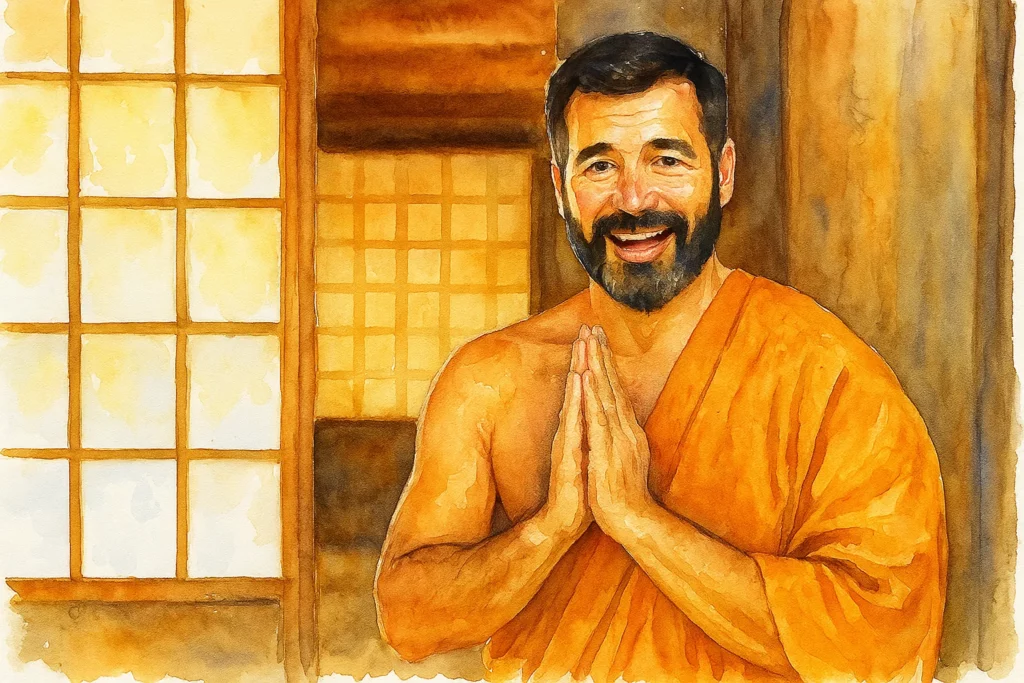The Vedas say that first of all one must understand that there are pious and sinful activities, as well as activities that bring the highest good, and concentrate on the latter.
Nowadays many people hear the word “karma”, but not everyone knows its meaning. This concept, taken from ancient Vedic philosophy, has in recent years penetrated into various areas of our lives: the press, computer games, everyday conversations and even stores. Until recently, one could see posts in which, in a joking manner, people were asked to like with the inscription “+1 to karma.” In fact, this word has become a household expression for encouraging a good deed. On forums it is used as a concept akin to reputation, and someone introduces it as a currency in computer games.
What is karma? Translated from Sanskrit, this word means action, namely cause-and-effect relationship. If we turn to the Holy Scriptures, then there we can find expressions known to all of us, which also describe the essence of karma.
For example, in the Epistle of the Holy Apostle Paul to the Galatians“Do not be deceived: God cannot be mocked. Whatever a man sows, that he will also reap: he who sows to his flesh will reap corruption from the flesh, but he who sows to the Spirit will from the Spirit reap eternal life” (Gal. 6:7-8). Or the following example from the Gospel of Matthew: “Judge not, lest ye be judged, for with the judgment ye judge, ye shall be judged; and with the measure you use, it will be measured to you” (Matt. 7:1-2).
Despite the fact that the concept of karma has been very widespread lately, few can say what is behind it. If you understand it superficially, it seems that this is some kind of inevitability or suffering. Anyone who seeks to understand this issue in more detail discovers for himself a universal key to understanding all the events in his life. For such a person, the understanding suddenly opens that everything that happens around him is a string of skillfully constructed and planned episodes.
Gradually, a person begins to understand that things like cancer and traffic accidents do not just happen. Everything has its own need. However, those who do not study the laws of karma are at such moments inclined to indulge in grief and complain that there is no justice in this world. Such a person sincerely does not understand why this happened to him, why he received such suffering. And this is really difficult to understand unless you take into account the idea of reincarnation.
According to Vedic philosophy, we live not one life, but an infinite number. When we get into different bodies, we commit both good and bad deeds. All of them are deposited in a certain data bank in the subtle body, which stores all the information about us. Thus, actions from past lives dictate our next birth, family, parents, character, abilities, wealth, etc. Each past life programs our next. It turns out that our future depends on how we live now.
When analyzing the law of karma, first of all you should understand that for every action there is a consequence. Whatever we do, there will certainly be an answer. Since we are active by nature and subject to the influence of the modes of material nature, we cannot remain inactive. Every second of our lives we perform some actions, and this, in turn, leaves a certain imprint on our future in the form of something that can manifest itself in this destiny or in subsequent lives.
If a man, before leaving his wife and children, knew about his suffering in the future, do you think he would do it or not? If he knew that in his next life he would be born a child who would be abandoned by his father and who would suffer all the suffering of life without a father, he would probably hardly have decided to do such an act.
Our problem is that we are in ignorance. And even the fact that we have been listening to lectures and working on ourselves for many years does not give us guarantees that we will not fall into the traps of our own illusions. By acting in one way or another, we call upon the Universe to respond to our action. Whether the answer is good or bad depends entirely on us.
Thus, one of the properties of karma is its irreversibility. We can choose an action, but we cannot choose its consequences. We also cannot stop what comes next. We can't say we've changed our minds once we've pulled the trigger of the gun. Therefore, if we commit some actions, then we need to have the courage to accept what will come after them.
Crime stories often show criminals arrested for petty theft or hooliganism. They are detained for stealing a phone or trying to rob someone. Their trouble is that the immediate desire for profit drives them to commit such actions, but they have to pay for it in a real time frame. If at the time of the attack they had thought about what the consequences might be, their lives would not have been so distorted.
Let us give another example that is well known to everyone. When a guy and a girl get married, they swear love and fidelity to each other. It seems that this has already become part of the tradition, so newlyweds may not attach much importance to this ritual. However, at the moment of the oath, the mechanisms of karma are activated. Therefore, when problems begin in family life, and they certainly will arise, the spouses will have to answer again and again for the decision they once made. Therefore, marriage should not be concluded as a joke or for someone's self-affirmation. This is a very serious decision, which entails equally serious consequences not only for the husband and wife, but also for their children.
Reasoning in this way, a person understands that his whole life is woven from actions. Therefore, you need to carefully study which actions can and should be performed and which cannot. Therefore, next we will look at three types of karma, which will give us an idea of how to live correctly and what we need to invest in.
1. Punya-karma - actions performed in goodness, for the benefit of all beings, have a creative character. The result of these actions is piety.
2. Vikarma - destructive, sinful actions. The result is suffering. By performing vikarma, a person goes against his own nature and against the nature of other living beings. He wants to act only for himself, for his own selfish purposes.
3. Akarma is pious activity aimed at serving people and God. It brings neither piety nor suffering. This is exactly what the scriptures call action in inaction.
What is better to do: punya-karma or akarma? At first glance, it seems that it is punya karma, because according to the law, a person must receive pleasant fruits for it. However, the sages believe that it is better to perform akarma. Why? For example, you gave 100 rubles to a person in order to get some benefit for yourself, for example, to make your life easier. According to the law of karma, you will have to be born into this world again in order for this money to be given to you.
However, if a person understands that endless birth in the material world is evil, he does not strive to create fertile ground for this. Therefore, people who have realized the truth know that it is better not to appear in this world again, but to receive liberation. That is why they perform akarma, an activity that brings them neither happiness nor suffering.
It should be noted that the intricacies of karma cannot be understood. The scriptures tell us that even the wise can become confused about what is action and what is inaction. Therefore, you don’t need to think too much about how karma works, how I lived in a past life, where I will be in the next, etc. The Vedas say that first of all you need to understand that there are pious and sinful activities, as well as activities that bring the highest good, and focus on the latter. This is the main thing to understand when studying the law of karma.
The Bhagavad-gita says: “The intricacies of activity are very difficult to understand. Therefore, one must know well what action is, what prohibited action is and what inaction is” (4.17).
The truth is that a person can act differently than he should according to his destiny. Unlike animals, we always have a choice of how to act: pious or sinful. And freedom lies in not being led by your desires, but being guided by reason.
Let us again refer to the Bhagavad-gita:“Therefore, on the basis of the Holy Scriptures, you should understand what your duty is, what you can do and what you cannot do. Having studied all the instructions, one must act in such a way as to gradually achieve perfection" (16.24).
Therefore, if we want to do bad things, we need to try to stay on the platform of reason. Thus, having the right vector, we will gradually gain the ability to get rid of the desire to commit sinful activities.
The Vedas explain that if we strive to develop spiritual taste, we will gradually feel that it is a thousand times stronger and more pleasant than sinful taste. Having acquired spiritual taste, we will be able to control our actions, directing our activities towards the service of God (akarma), and thus gain liberation from the material world.





